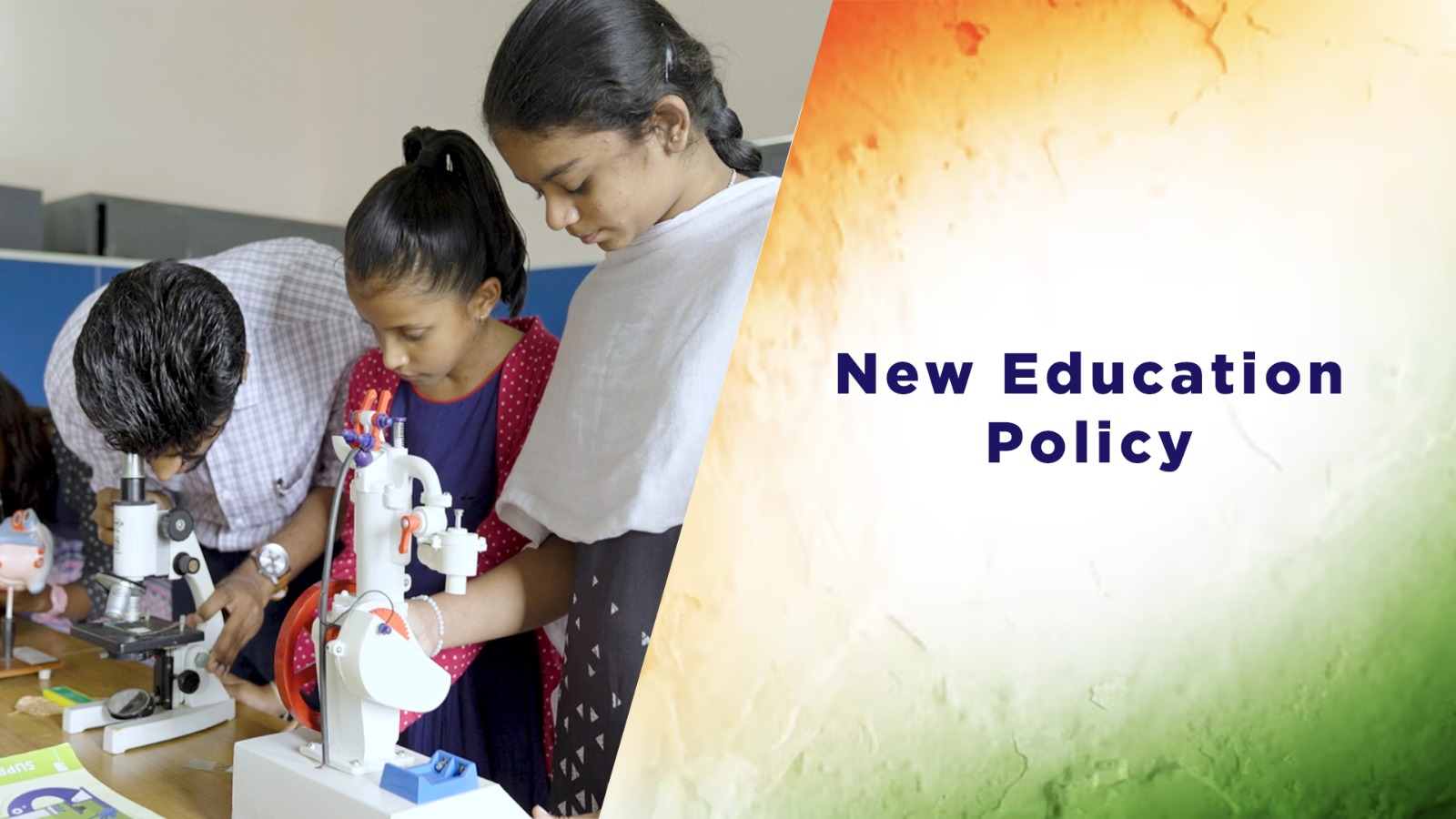New Education Policy of India – How It Is Transforming India’s Education Landscape

New Education Policy of India – How It Is Transforming India’s Education Landscape
Last Updated On: 13/03/2024
rohit chavan
School Owner

“Education is what survives when what has been learned has been forgotten.” – B.F Skinner.
The Comprehensive Framework of the Transformative Vision
In a broader context, the New Education Policy (NEP) introduces an extensive framework that spans the spectrum of education, covering elementary to higher education and vocational training. With transformative goals set to reshape India’s education system by 2030, this comprehensive initiative aims to create a dynamic and holistic educational environment.
Going beyond immediate educational needs, the NEP envisions a system that not only equips students for the present but also prepares them for future challenges. This forward-looking approach underscores a commitment to fostering innovation, inclusivity, and academic excellence, marking a significant milestone in the evolutionary journey of India’s education sector.
In this article

Provisions of NEP: Understanding Foundations of Change

The Impact of New Education Policy Implementation

LEAD Group’s Readiness for Implementing the New Education Policy
Provisions of NEP: Understanding Foundations of Change
- Investment and Pedagogical Structure
Under NEP, the goal is to double state expenditure on education from around 3% to 6% of the GDP. It prioritises achieving universal foundational literacy and numeracy by Grade 3. The language policy emphasises the use of the mother tongue or local language as the medium of instruction.The restructuring of school exams involves a shift from the “10 + 2” model to a more flexible “5+3+3+4” model. The exam overhaul includes students attending exams only in classes 2, 5, and 8, with redesigned board exams for classes 10 and 12 that are to be held twice a year.
- Language Policy in Focus
NEP recommends using the mother tongue or local language till Class 5 and a multilingual approach with students learning three languages. The language policy provides broad guidelines, with implementation left to states and institutions.
- Teacher-Centric Reforms
By 2030, a 4-year Bachelor of Education becomes the minimum requirement for teachers. The teacher recruitment process is strengthened and made transparent with curriculum frameworks like the National Curriculum Framework for Teacher Education.
- Embracing EdTech for Transformation
NEP encourages EdTech companies to develop learning management systems, ERP software, and assessment platforms. The National Educational Technology Forum (NETF) is established as an autonomous body to facilitate the exchange of ideas on technology usage in education.
- Indigenous Knowledge and Cultural Heritage
The policy underscores the importance of India’s native knowledge systems, leading to initiatives guiding research and propagating understanding of indigenous knowledge.
Never miss a story
Stay updated with the latest news and articles related to school education
GIVE YOUR SCHOOL THE LEAD ADVANTAGE
The Impact of New Education Policy Implementation
- Ensuring Education Access for All
- Prioritising the Cultivation of Skills
- Promoting Inclusive Education for Every Learner
- Adopting a Comprehensive and Diverse Educational Approach
- Enhancing Teacher Training and Continuous Professional Growth
- Providing Subject Choice Flexibility
- Integrating Technology into Education
LEAD Group’s Readiness for Implementing the New Education Policy
As India’s largest School EdTech company, LEAD Group specialises in delivering personalised and technology-driven learning solutions to schools and students. Demonstrating a commitment to educational excellence, LEAD Group offers a diverse array of instructional options that adhere strictly to the guidelines set forth in the NEP.
- Digital Classroom Solutions
LEAD has introduced a range of technology-driven solutions, such as digital classroom software, designed to assist schools and students in navigating the evolving educational landscape.
- Early Childhood Curriculum
Tailored to pre-primary education, this curriculum incorporates instructional methodologies, resources, and age-appropriate content, fostering a foundation for advanced learning. Following a comprehensive, theme-based approach, the curriculum aligns with the principles of Early Childhood Care and Education outlined in the NEP.
- English Language and General Awareness (ELGA)
Addressing five key components of English language learning—Writing and Speaking Expression, Whole Words, Phonics, Grammar, and Reading and Listening Comprehension—ELGA stands as a unique, skill-based programme aimed at enhancing children’s proficiency in English.
- Professional Development for Teachers
Recognising the pivotal role of educators in implementing the NEP, LEAD has devised teacher training modules to empower teachers with a deep understanding of the new policy guidelines and facilitate their adaptation to innovative teaching methodologies.
- Internationally Aligned Curriculum
Rooted in extensive research and standardised to international benchmarks, LEAD’s curriculum draws upon best practices from various nations, aligning seamlessly with the objectives of the NEP.
- Continuous Assessment and Feedback
LEAD offers real-time feedback and reviews to students, enabling them to monitor their progress and enhance their learning outcomes. This approach resonates with the principles outlined in the NEP, emphasising the importance of continuous assessment.
Conclusion
In India’s educational evolution, the New Education Policy of India stands out as a beacon of change. From reshaping language policies to reimagining the structure of school and higher education, the NEP is a comprehensive roadmap for the future. LEAD Group’s approach to implementing the NEP is comprehensive and aligns with the policy’s core objectives. Embrace a comprehensive approach to NEP implementation with LEAD as your partner and witness the dawn of a new educational era in your school!
Article Summary
Article Summary
- The introduction of the National Education Policy (NEP) has significantly transformed India’s educational landscape, marking a pivotal shift in the nation’s approach to learning and development.
- The New Education Policy (NEP) introduces a sweeping framework covering elementary to higher education and vocational training. With transformative goals for reshaping India’s education system by 2030, it envisions a dynamic and holistic educational environment, emphasising innovation and inclusivity.
- The NEP focuses on doubling state expenditure on education, achieving universal foundational literacy, and restructuring exams. Language policies, teacher-centric reforms, embracing EdTech, and promoting indigenous knowledge are key aspects reshaping the educational landscape.
- NEP’s impact includes ensuring education access, prioritising skill cultivation, promoting inclusive education, adopting a diverse educational approach, enhancing teacher training, providing subject flexibility, and integrating technology into education.
- As India’s largest School EdTech company, LEAD Group aligns with NEP guidelines through digital classroom solutions, early childhood curriculum, English language programs such as ELGA, teacher professional development, internationally aligned curriculum, and continuous assessment methods.
